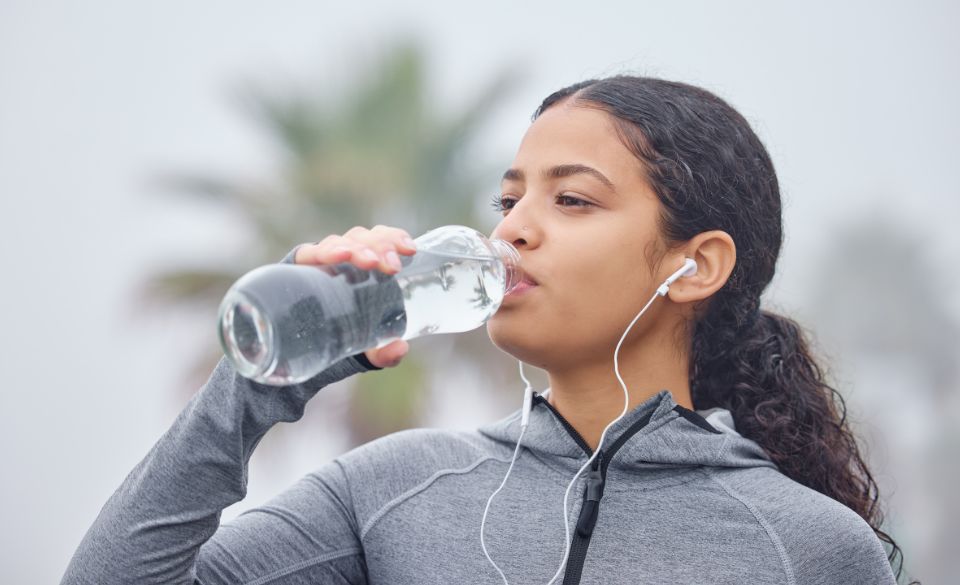
What is Hydration in Fitness?
Page Contents
- The Basics of Hydration: More Than Just a Drink
- The Sweat Factor: Hydration and Exercise
- Signs of Dehydration: Listen to Your Body
- Hydration Strategies: Before, During, and After Workouts
- Hydration Hacks: Making It a Habit
- Hydration’s Ripple Effect: Beyond Fitness
- In Conclusion: Hydration’s Role in Fitness Success
When it comes to achieving your fitness goals, you might focus on aspects like strength training, cardio workouts, and proper nutrition. However, there’s one crucial element that often doesn’t receive the attention it deserves: hydration. Yes, that simple act of sipping water throughout the day plays a pivotal role in optimizing your fitness journey. In this article, we’ll dive deep into the world of hydration in fitness, exploring its importance, impact, and how to stay adequately hydrated to support your active lifestyle.
The Basics of Hydration: More Than Just a Drink
Hydration in fitness is about more than just quenching your thirst. It’s a fundamental component of overall well-being and physical performance. Picture this: your body is like a finely tuned machine, and water is its lifeblood. Just as a car needs fuel to run efficiently, your body needs water to function optimally. Water is involved in nearly every physiological process, from regulating body temperature and lubricating joints to transporting nutrients and oxygen to cells.
When you engage in physical activity, whether it’s lifting weights, running, or doing yoga, your body heats up and sweats to cool down. This process results in fluid loss, which, if not replenished, can lead to dehydration. Dehydration can hinder your workout performance, reduce energy levels, and even affect cognitive function. Studies, such as one published in the Journal of Athletic Training1, have shown that even mild dehydration can lead to decreased exercise performance and increased perceived effort.
The Sweat Factor: Hydration and Exercise
As you embark on your fitness journey, it’s essential to consider the sweat factor. The more you sweat, the more fluid you lose, making hydration an even more critical factor to address. Sweating is your body’s natural mechanism for cooling down, but it also means you’re losing valuable fluids and electrolytes. Electrolytes are minerals like sodium, potassium, and magnesium that play a vital role in maintaining fluid balance and muscle function.
To maintain optimal hydration during exercise, it’s not only about drinking water but also considering electrolyte intake, especially during longer or more intense workouts. Some fitness enthusiasts turn to sports drinks or electrolyte-enhanced beverages to replenish electrolytes lost through sweat. However, it’s important to strike a balance, as excessive electrolyte consumption can lead to imbalances and potential health issues. The key is to listen to your body’s cues and make informed choices based on your workout duration and intensity.
Signs of Dehydration: Listen to Your Body
Your body has a remarkable way of communicating its needs, and when it comes to hydration, it’s essential to listen carefully. Dehydration can manifest in various ways, and recognizing these signs can help you take action before it negatively impacts your fitness routine. Common signs of dehydration include increased thirst, dark yellow urine, dry mouth, fatigue, dizziness, and muscle cramps. If you experience any of these symptoms, it’s a clear signal that your body is in need of hydration.
Moreover, it’s worth noting that the sensation of thirst doesn’t always kick in until you’re already mildly dehydrated. By the time you feel thirsty, your body might already be functioning below its optimal hydration level. This is why proactive hydration, both before and during exercise, is crucial. Keep a reusable water bottle with you, and take regular sips throughout the day, not just when you feel thirsty.
Hydration Strategies: Before, During, and After Workouts
To make hydration a seamless part of your fitness routine, consider adopting a strategic approach. Start by hydrating well before you even hit the gym. Aim to drink water throughout the day, maintaining a steady intake to ensure you’re starting your workout hydrated. Downing a glass of water shortly before your workout can also provide an extra boost.
During your workout, especially if it’s intense or lasts longer than an hour, aim to sip water regularly. If you’re engaging in prolonged or high-intensity exercise, consider incorporating electrolyte-rich beverages or natural electrolyte sources like coconut water.
After your workout, your body continues to recover and rehydrate. Replenish lost fluids by drinking water, and you can also opt for a post-workout snack that includes hydrating foods, such as water-rich fruits like watermelon or cucumber.
Hydration Hacks: Making It a Habit
Incorporating proper hydration into your fitness routine doesn’t have to be a chore. With a few simple strategies and mindful habits, you can ensure that you stay adequately hydrated, both inside and outside the gym.
1. Hydration Tracking: Consider using a water bottle with time markers to track your water intake throughout the day. This visual cue can help you stay on top of your hydration goals.
2. Flavorful Infusions: If plain water isn’t your favorite, experiment with infused water by adding slices of citrus fruits, berries, cucumber, or mint. These natural flavors can make hydration more enjoyable.
3. Pre-Workout Ritual: Make it a ritual to drink a glass of water as soon as you wake up and another before you head to the gym. Starting your day with hydration sets a positive tone for your fitness journey.
4. Hydration Apps: There are numerous smartphone apps designed to help you track your water intake. These apps can send reminders and provide insights into your hydration patterns.
5. Post-Workout Hydration: After your workout, prioritize rehydration by drinking water and consuming hydrating foods. A balanced recovery meal can include a combination of lean protein, whole grains, and water-rich vegetables.
6. Listen to Your Thirst: Trust your body’s signals. If you feel thirsty, take a sip of water. If you’re engaging in intense or prolonged exercise, have water or an electrolyte beverage on hand.
7. Hydration Buddy: Enlist a friend or workout partner to join you in your hydration journey. Having someone to share your goals and progress with can provide extra motivation.
Hydration’s Ripple Effect: Beyond Fitness
While hydration is a vital component of your fitness regimen, its impact extends far beyond the gym. Staying well-hydrated supports your overall health, mental clarity, and daily activities. From boosting your skin’s appearance to aiding digestion and reducing the risk of headaches, hydration is a holistic practice that enhances your well-being.
Moreover, practicing mindful hydration can inspire positive habits in other areas of your life. Just as you make conscious choices about the fluids you put into your body, you might find yourself making healthier decisions about the foods you eat, the rest you prioritize, and the overall self-care you embrace.
In Conclusion: Hydration’s Role in Fitness Success
Hydration is an often underestimated yet powerful factor in achieving fitness success. Proper hydration supports your body’s functions, enhances exercise performance, and aids in recovery. By making hydration a conscious part of your fitness routine, you’re setting yourself up for a more effective and enjoyable journey.
Remember, there’s no one-size-fits-all approach to hydration, as individual needs can vary based on factors like body size, activity level, and climate. Pay attention to your body’s signals, monitor your fluid intake, and adjust accordingly. Whether you’re lifting weights, hitting the trails, or mastering a new yoga pose, let hydration be your trusted companion on the road to fitness excellence.




